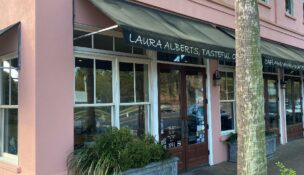On the Menu for Nov. 20, 2018
Staff Report //November 20, 2018//
On the Menu provides the latest news from the Charleston area’s culinary community, including new restaurants, new menu items and upcoming events, as well as details about local chefs. ATTENTION: Submissions should now be made using our online form.
Clemson Cooperative Extension agent Amy Dabbs has become the statewide coordinator for the school and community gardening program — a newly created position for extension’s horticulture team.
 Dabbs, who is based at Clemson’s Coastal Research and Education Center in Charleston, will coordinate all horticultural aspects of school and community gardening and serve as a resource to program teams and agents who engage groups of constituents through gardening.
Dabbs, who is based at Clemson’s Coastal Research and Education Center in Charleston, will coordinate all horticultural aspects of school and community gardening and serve as a resource to program teams and agents who engage groups of constituents through gardening.
“By training teachers, parents and volunteers to garden with children, we will grow lifelong gardeners and introduce students to careers in agriculture and horticulture. There is a huge lag in workers qualified to fill horticulture jobs in the U.S.,” she said in a news release.
The School Gardening for S.C. Educators program, a horticulture-based training program that was piloted in 2012 while Dabbs was a local horticulture agent in the Lowcountry, had grown to 16 counties and 147 school gardens across the state as of this summer, according to the news release.
School Gardening for S.C. Educators is offered by Clemson Extension as part of a multiagency, farm-to-school initiative aimed at improving academic and health outcomes among S.C. children and opening the school nutrition market to local farmers.
Carolina Seed Systems, a company born out of research from Clemson University’s Advanced Plant Technology Program, is working to build a feed grain pipeline throughout the Southeast.

The company is working to address a lack of feed grain hybrid crop development and a regional feed shortage, according to a news release from Clemson.
Grain sorghum — a cereal grain often used as a substitute for corn and feed in the animal industry — is highly drought-tolerant and is efficient in its nutrient use, making it a sustainable crop option for farmers that lowers their seed cost and increases their profitability, the news release said.
Zachary Brenton, a graduate of Clemson’s APT Program, began Carolina Seed Systems and works to determine what genes in sorghum help it adapt to the S.C. and Southeast climate.
The APT Program is part of a larger effort by Clemson to optimize plants for production in South Carolina and the Southeast for all agricultural stakeholders — from large-scale producers to small-scale landowners who work with heirloom varieties for restaurants, brewers and more. The company’s regional cultivars do not qualify as genetically modified organisms, the news release said.
Carolina Seed Systems received grant funding from SCRA for pilot production of its initial product.
The company plans to diversify its product line and provide additional products other than sorghum in the future.
g















